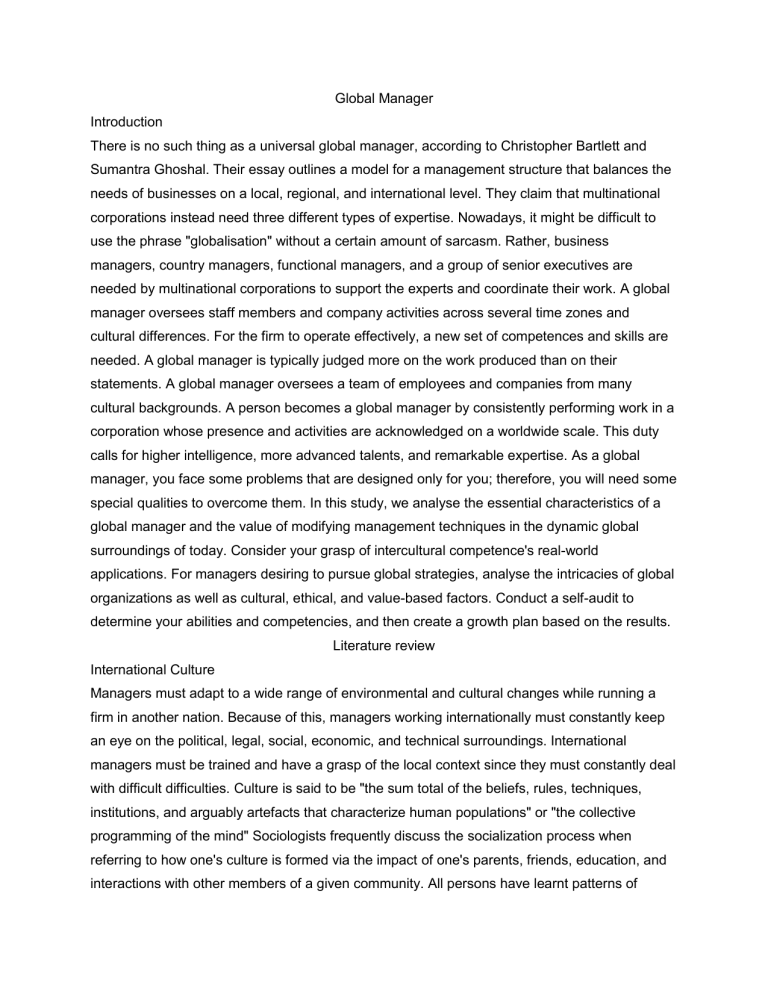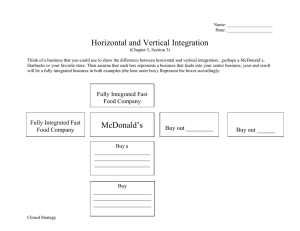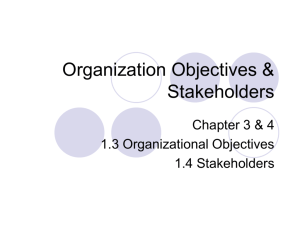
Global Manager Introduction There is no such thing as a universal global manager, according to Christopher Bartlett and Sumantra Ghoshal. Their essay outlines a model for a management structure that balances the needs of businesses on a local, regional, and international level. They claim that multinational corporations instead need three different types of expertise. Nowadays, it might be difficult to use the phrase "globalisation" without a certain amount of sarcasm. Rather, business managers, country managers, functional managers, and a group of senior executives are needed by multinational corporations to support the experts and coordinate their work. A global manager oversees staff members and company activities across several time zones and cultural differences. For the firm to operate effectively, a new set of competences and skills are needed. A global manager is typically judged more on the work produced than on their statements. A global manager oversees a team of employees and companies from many cultural backgrounds. A person becomes a global manager by consistently performing work in a corporation whose presence and activities are acknowledged on a worldwide scale. This duty calls for higher intelligence, more advanced talents, and remarkable expertise. As a global manager, you face some problems that are designed only for you; therefore, you will need some special qualities to overcome them. In this study, we analyse the essential characteristics of a global manager and the value of modifying management techniques in the dynamic global surroundings of today. Consider your grasp of intercultural competence's real-world applications. For managers desiring to pursue global strategies, analyse the intricacies of global organizations as well as cultural, ethical, and value-based factors. Conduct a self-audit to determine your abilities and competencies, and then create a growth plan based on the results. Literature review International Culture Managers must adapt to a wide range of environmental and cultural changes while running a firm in another nation. Because of this, managers working internationally must constantly keep an eye on the political, legal, social, economic, and technical surroundings. International managers must be trained and have a grasp of the local context since they must constantly deal with difficult difficulties. Culture is said to be "the sum total of the beliefs, rules, techniques, institutions, and arguably artefacts that characterize human populations" or "the collective programming of the mind" Sociologists frequently discuss the socialization process when referring to how one's culture is formed via the impact of one's parents, friends, education, and interactions with other members of a given community. All persons have learnt patterns of conduct because of these influences. Culture that transcends national boundaries is referred to as international culture. It is not exclusive to any one nation, ethnic group, or even continent. Given this description, it is not unexpected that universal culture is sometimes used to describe global culture. Many businesses have expanded recently, entered the worldwide market, and created multicultural staff (Luthans & Doh 2018). Business culture is a standard practise that is professionally acceptable in one area but varies in other locations. Culture refers to an individual's or a society's beliefs, social interactions, and traditions. International culture has an impact on firms and may aid global managers in making the greatest first impressions on markets. For their businesses to succeed internationally, multinational corporations must comprehend the cultures of other countries. An organization that wants to compete in the global market must give top importance to studying the cultural norms and taboos of the target nation. It is crucial to understand cultural differences, which can be quite subtle. In China, a peaceful workplace is more significant than regular output. If women are employed at all, they are not frequently seen in managerial roles in Pakistan. A business may have severe misunderstandings and a total lack of trust if it does not comprehend cultural business practices. The significance of labour in people's life differs from nation to nation and from culture to culture, as does how people react to incentives and penalties. Americans frequently prioritise personal development, success, and "getting what you deserve" for work well done as the most significant motivators. Asian cultures may place greater value on preserving group cohesiveness and advancing collective goals than on recognising individual success. Similar to how it might affect what motivates workers, culture can also affect how people react to incentives and consequences. For instance, the Japanese believe that labour is an essential component of their life. The Japanese propensity to put up with things that employees in other nations would find unacceptable may be explained by their strong sense of community and their conviction in the value of labour. Many multinational corporations have experienced language barriers, with outcomes ranging from minor humiliation to complete failure. Translations into other languages may cause even seemingly innocent company names and advertising words to acquire hidden or unexpected implications. In translations, advertising concepts frequently gain or lose something. Managers should be aware that several other, subtler errors might affect product performance in less visible ways while going unnoticed. Ethics Ethics are moral rules that people must follow when engaging in a certain activity or action. Leaders who want their companies to succeed in the global marketplace need to be aware of concerns like human rights, child labour, religion, politics, workplace diversity, working conditions, and standards, as well as issues like trust and integrity, bribery, and corruption (Lu & Lin 2014). Global managers must make difficult choices in order to succeed while trying to navigate these moral dilemmas. In international business, acting ethically has several advantages. The pursuit of sustainable development requires expertise and professionalism (Feng, Wang, Lawton, & Luo 2019). This relates to building a strong relationship between leaders, workers, and consumers via honesty and trust. For instance, employing staff through bribery and corruption tars a company's reputation. When a firm is recognized for upholding high ethical standards in all areas, it attracts investors, maintains its share price, and is therefore protected against takeover. Things that were formerly considered ethical have changed to become immoral in the present society. For instance, while sexism and racism may have been tolerated, the majority of people today rarely identifies with them. The manager needs a variety of specialized talents due to the evolving and coming up of new demands in the globe. Political, technical, cultural, economic, and market influences are just a few of the main obstacles that global managers who are operating businesses abroad are most likely to face. The struggle between nations, the variety of human rights, and severe human rights violations are a few ethical problems a global manager could encounter. There is a higher chance of running across more major ethical problems in company environments that are more sophisticated. For example, businesses in the US are barred from discriminating against locals, breaking local laws, and facing harsh penalties if they disregard the environment and its property. Normative theories suggest that good management entails abiding by the law, even when it causes pain. The ethics will be able to be developed and put into practice by a global manager. By acting responsibly as a manager and ensuring that they are aware of your ethical behaviour, you may encourage your supervisors and employees to follow suit. Another approach is to list some of the penalties for ethical transgressions. A healthy and supportive culture will exist when the management puts ethics first. Values-based Considerations The management guides the business in determining what they believe the deal to be, and then they focus heavily on increasing that value. This style of leadership also demonstrates and communicates the worth of both the leader and all of the employees. By putting their principles into practise in daily tasks, people will be more driven. Employees at a firm with the same philosophy will cooperate, resulting in high output. The value leadership hypothesis provides an explanation for value-based consideration. When developing the company's value statement, a global manager is supposed to take all cultural views from every variety into account. This quality is ideal for a worldwide manager who has long-term goals, such as one who works for an organisation that prioritises shareholder value over immediate profits. A global manager who practises value-based leadership will raise productivity inside the organisation. This is accomplished by creating a value statement that will serve as a guide for all employees inside the company, regardless of the job held. More stakeholders and investors are drawn to a firm when everyone works harmoniously and cooperatively. The boss and the staff will foster a culture of cooperation. As a result, the firm will become more valuable to its stakeholders and customers of its products and services. Some traits shared by these leaders are necessary for a global manager who embraces the value-based attribute. These people are leaders with assurance. These leaders have demonstrated that they can retain a high level of assurance. They are completely aware that certain leaders are superior to them, nevertheless. These leaders are aware of their advantages and disadvantages, balancing the two to prevent weaknesses from outweighing strengths. Additionally modest, these executives have a beneficial impact on the company. Value-based leadership is advantageous to the organisation since it will ultimately lead to improved employee relations, higher productivity levels, and the accomplishment of organisational objectives. A global manager can increase value and earnings by forming a joint venture in a foreign market. Making cross-cultural teams is also beneficial since it brings individuals with various viewpoints together, fosters innovation, and results in the production of high-quality goods. Physical interaction between global management and employees will boost the worth of the produced goods. Along with gaining access to new markets and distribution channels, new expertise, and more resources, sharing the risks and expenses also lowers initial capital requirements (Nippa & Reuer 2019). Interactions among professionals improve positivity, morale, and job satisfaction, which enhances value generation even while they are only sometimes successful (Oberer & Erkollar 2018). Case Study McDonald's serves more than 69 million people per day over 38,695 locations in 120 countries. With 1.9 million employees, it the largest restaurant chain in the world by sales. McDonald's sells chicken products, breakfast meals, soft drinks, milkshakes, wraps, and desserts in addition to its well-known hamburgers, cheeseburgers, and french fries. The income is derived from sales in company-owned restaurants as well as rent, royalties, and other fees paid by franchisees. McDonald's Corporation generates income from real estate investments, franchisee fees, and sales at restaurants under its own management. As a worldwide company, McDonald's restaurant celebrates cultural diversity and modifies its foreign menu to better cater to local clients. International Culture In terms of business expansion and revenue, McDonald's is still seeing growth. The company's operations have grown more rapidly because of the globalisation of those operations, and this success in the fast food services sector is attributable to the company's ability to expand its operations. McDonald's globalisation approach is built on an appreciation of cultural variances. McDonald's adheres to the basic menu across cultures but modifies it to suit regional preferences. McDonald's "Think Global, Act Local" business philosophy has proven effective in many regions of the world. The development of new menu items demonstrates respect for cultural diversity and adherence to national policies. In order to evaluate its products, the corporation adds or removes food items based on consumer demand and local fashion trends. Innovation and adaptation are the two main ingredients for the success of McDonald's fast food outlets around the globe. The business develops a wide range of products and services to meet the demands of a market that is made up of a wide range of consumers, basing their selections on consumer demographics, regional, and economic variables. The McDonald's in the U. S. is very unlike from those in China, Japan, and India. The business has made a commitment to learning about the favoured cuisines in many cultures. It has modified the menu to incorporate dishes that are well-liked in particular nations. This has made it possible for McDonald's to expand its market share internationally. The system is valued more highly at McDonald's than individual interests. As a result, a command and control system with centralised decision-making has been created. Instead than being influenced by the ideas of specific employees, the company's norms are established by its principles, policies, and practises. Denison's concept suggests that culture may be seen of as a tool for establishing consistency. By offering quick, error-free services, the business enhances the client experience. In the majority of nations, the business takes into account the suggestions of its staff and clients while developing new products and procedures. For example, it customises its cuisine and restaurant interiors to suit the preferences of each market. Ethics The firm's reputation is important since consumers' trust and loyalty are founded on how the company presents itself. Global ethics are crucial since they will assist the organisation maintain excellent relationships with the people in the area and attract additional clients. Respecting human rights in business, the land and environment, property, and local laws and beliefs are all important ethical considerations. The process of creating a marketing plan could persuade the company entity to go against the established ethical standards. The main goal of ethical standards is to make sure that the organisation achieves its main goals. Every sector has its own set of rules that the participants are required to follow. All companies conducting business in the contemporary global market must adhere to certain requirements. As a result, it is necessary to look at some of the moral standards that businesses must meet. Over the past three decades, McDonald's Corporation has expanded across the globe. McDonald's and similar corporations have managed to frame themselves as a good representation of Americana despite the fact that they pay their workers poor salaries and have a detrimental influence on other cultures. Although this huge fast food firm is recognised for its unethical behaviour, this does not appear to diminish the all-American image that the company is trying to portray. Even while McDonald's makes an attempt to help kids with serious diseases, the food promoted by this company and others may also be a factor in the development of obesity, heart disease, asthma, and perhaps mad cow disease. McDonald's has been charged with having a variety of environmental violations. This is because they have constructed countless factories throughout the world to manufacture their goods, which has resulted in pollution. They also continue to use dining utensils made of paper and plastic, such as paper plates and plastic forks, which indicates that they are still harming the environment. Values-based Considerations According to McDonald's, their sustained success depends on having a team of skilled workers from a variety of backgrounds and experiences who collaborate in an atmosphere that values respect and promotes high levels of engagement. They open doors, foster talent, create leaders, and honour success. Customers are the cause for their business's existence, and they show their gratitude by giving them excellent food and service. The "three-legged stool" of owner/operators, suppliers, and workforce is the basis of McDonald's business model, and striking a balance between the interests of the three groups is crucial. We at McDonald's uphold the highest values of justice, honesty, and integrity in how we run our company. Individually and collectively, McDonald's are liable. They take their leadership obligations very seriously. McDonald's supports RMHC, assists its patrons in creating better communities, and uses its size, breadth, and resources to improve the world. A publicly traded corporation is McDonald's. McDonald's strives to provide stockholders consistent, profitable growth as a result. This necessitates constant attention to both the wellbeing of their system and their clients. McDonald's is a learning company that strives to foresee and address the demands of customers, employees, and system via continuous evolution and innovation. Self-audit According to Lane and Maznevski, a global mentality should include extensive knowledge about and awareness of culture (2014). Every global manager needs to be aware of international culture. I have participated in a variety of leadership-related events and provided excellent leadership. Therefore, I will give myself a seven out of the possible ten. There are people from many cultures and ethnicities at university. The capacity to manage a worldwide corporation with varied cultures may be shown in one's ability to lead a university and produce the best. Learning from those who have come before you will take time if you want to develop into a competent leader. Learning entails picking up and putting into practise some of the theoretical features while reading, observing others, or both. In this context, culture refers to a group of people's agreement on what acts signify the form of life. According to Hofstede, culture is a shared mental state that distinguishes a group of people from one another. I am confident that I have the quality of good behaviour, and people like me because of it. I rate my behaviour a nine out of 10, which is good. I have a basic understanding of the law, and I am adaptable enough to get along with people wherever I go. A worldwide ethical manager conducts themselves according to the greatest standards of self-acceptance and imposes morally required standards on themselves (Lane & Maznevski 2014). Such a leader makes sure that workers are valued and offers comfortable working environments. I am aware of all these moral criteria, and in my capacity as a worldwide manager, I can make sure that every leader and employee abides by them. To score 10 out of ten, though, I still need to improve my expertise in this area. Even though I am aware of how to create value, I do not know how to ensure that decisions based on values are successful in the global marketplace. According to Kienzler (2018), certain tactics, such as lowering pricing, produce results over time. Changing lifestyles, providing the finest quality, enhancing convenience, and enhancing customer service are further approaches to increase value, which I can comprehend. I just need to understand how to make my company decisions in the most efficient way possible. In conclusion, to effectively manage a company's operations abroad, a global manager needs a certain set of competencies and skills. People who understand what is right and wrong in business come from a variety of cultural backgrounds and are found in international marketplaces. These aspects of the target market should be understood by the global manager to be successful. Additionally, the manager must comprehend how to provide value to the company, which may be done by altering the behaviour of the clients. The investigation has looked at the key characteristics required in today's corporate climate for a global manager. The study also demonstrates how connection and understanding across cultural boundaries are crucial for corporate development. In addition, I have examined the complexity and significance of cultural, value-based, and ethical qualities in management. I now have a better knowledge of the crucial qualities required for the finest management thanks to this investigation.




